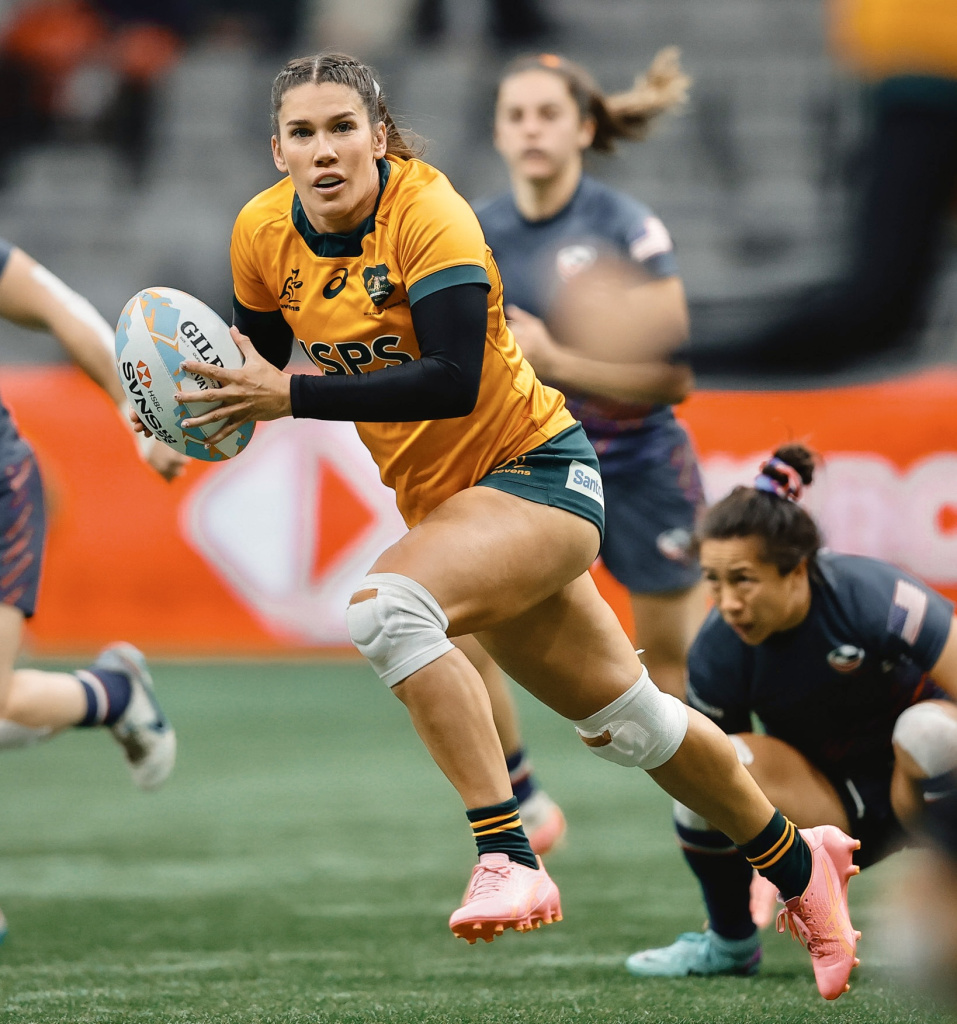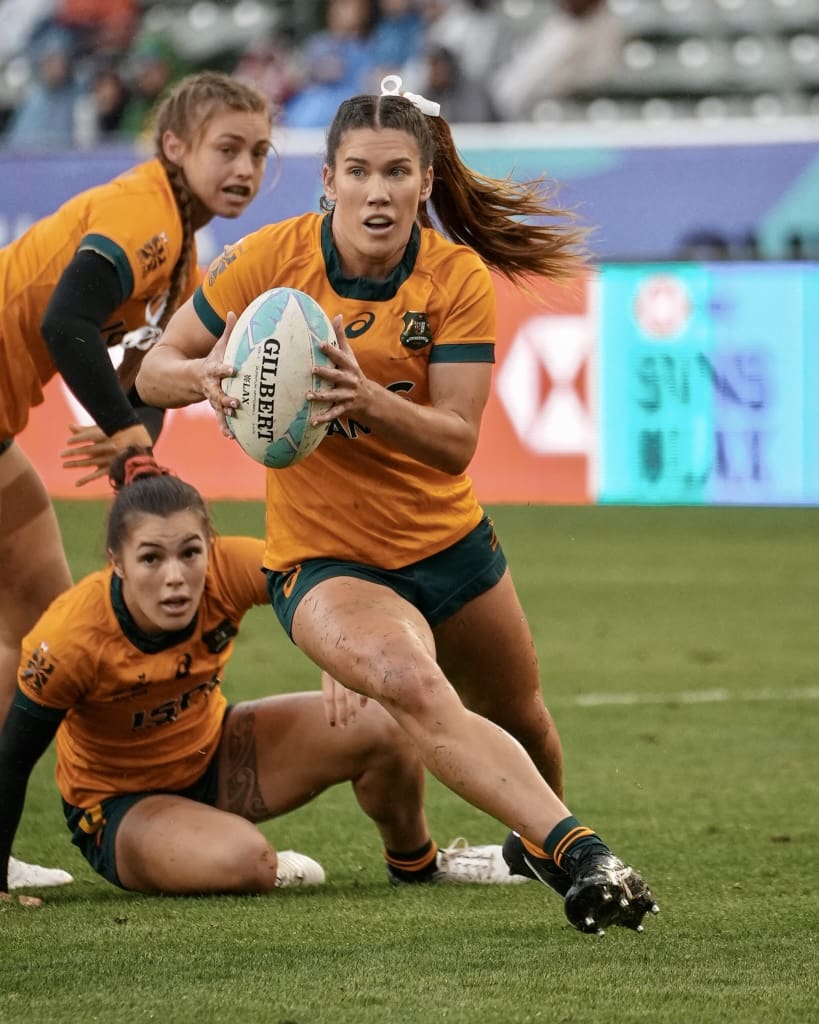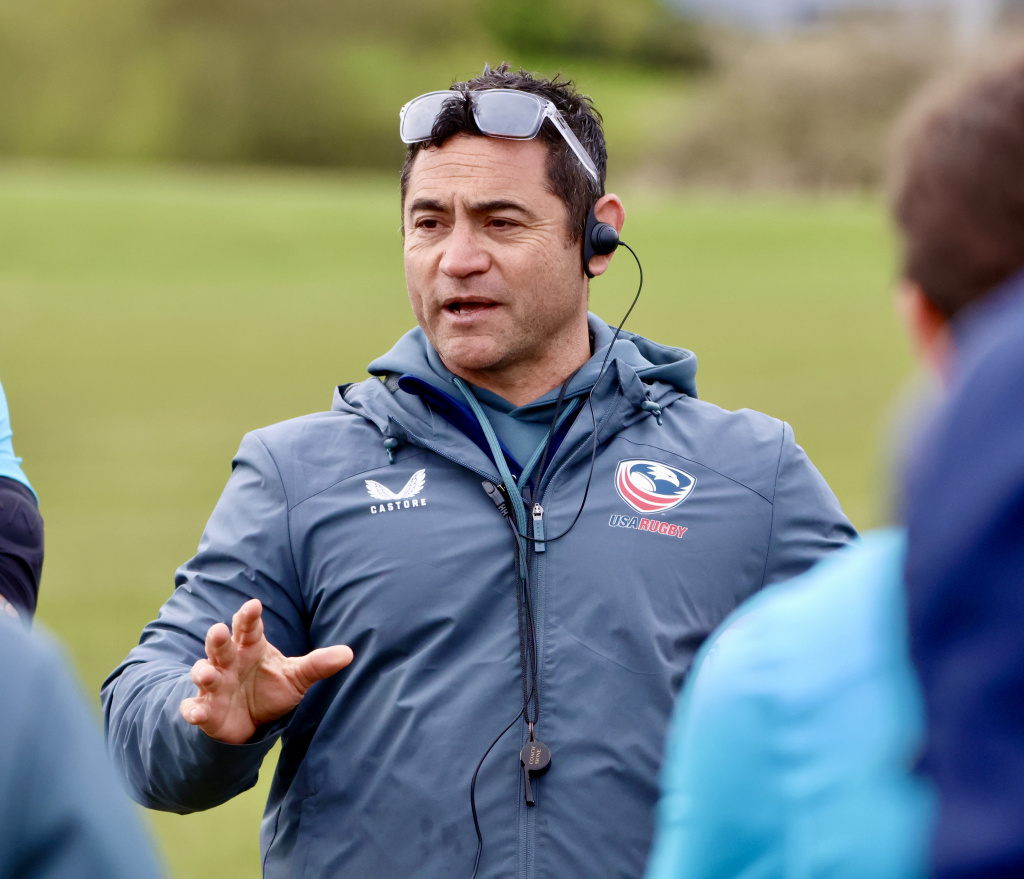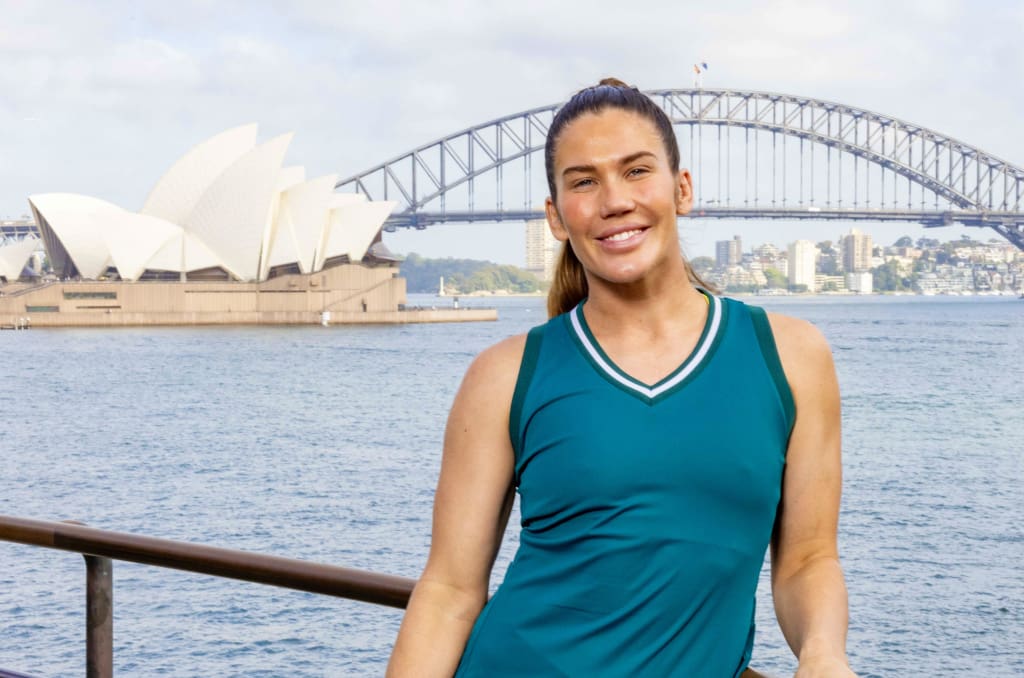Editor at Large Louise Evans meets the fearless leader who’s preparing to enter the lion’s den at the Paris Olympics, armed only with her innate speed, spirit and power.
Charlotte Caslick and her fellow warrior women are preparing for what will be one of the biggest events of the Paris Olympics – a fight against France in front of 80,000 screaming Gauls in rugby’s coliseum.
“It’ll be incredible,” the captain of Australia’s Sevens team said. “It’ll be a packed stadium and we’ll be playing one of the most passionate rugby countries in the world, at home in Paris at the Stade de France, at the Olympics. It’ll be amazing.
“We have the potential to bring home gold. We have a talented squad, we’re young across the playing group and we have the talent and desire to win gold.
“France and New Zealand will be strong. On form we’ll probably cross France in the semis. We are going there to win. We want to bring a gold medal home.”

Caslick already has Olympic gold, won when rugby Sevens debuted at the 2016 Rio Games. That gold medal proved a seismic turning point in elite women’s sport in Australia, with Caslick and her warrior women becoming overnight trail blazers.
For the first time Australians watched elite female athletes play a full-on contact sport at the highest level. It was ground-breaking, exciting, pivotal.
History followed. The AFLW kicked off in 2017 followed by the start of the National Rugby League women’s premiership in 2018.
“Until the introduction of Sevens rugby at the Rio Olympics it was foreign for people to see women playing elite contact sport,” Caslick said. “Rio changed people’s perceptions and helped normalise contact sport for women.
“The AFLW and NRLW started off the back of our success. Little girls can now grow up with the opportunity to play many sports at the elite level, which adds to competition among the different codes.
“It’s so cool that a girl of six can watch the Matildas, AFLW, women’s cricket or us. There’s so many options to be an elite sportswoman.

“There’s a lot of women doing great body positivity work too. You can be a fit, strong, healthy woman with any body shape and compete. There is a place for everyone. It’s so awesome. People can now see these women as something to aspire to, and be like that.”
Caslick, 29, has always been a ground breaker. When she was 13 she was playing under-19 touch football. At Brisbane State High School she trained with the first XV because there was no such thing as women’s first XV in 2012.
“The first XV coach Mr Sione (Fukofuka), let me train with the boys and the boys didn’t mind so it was cool,” Caslick said. “Having people who believe in you when you are a kid is really important. Mr Sione and my parents were very supportive.”
Fukofuka, who’s now head coach of the USA women’s national XV, said he included Calsick in his training group because of her advanced skills and ability.
“She had developed past her peers and needed to learn to play at a faster pace and be challenged by more experienced players,” Fukofuka said from Colorado, where he trains the Eagles women’s team.
“The boys were great and they embraced her. They included future Wallabies Samu Kerevi and Chris Feauai Sautia who had played touch with Charlotte and respected her football ability.
“So there was never an issue. Maybe a few bruised egos at times when she stepped on someone’s toes, but it was all in good spirits.”

Fukofuka said Caslick stood out as a future champion because of her strong competitive spirit to play and improve and her work ethic.
“She was naturally gifted in that she was athletic and had excellent game awareness, but on top of that her desire to compete was palpable at times,” he said. “Her work ethic and training intensity was another area that set her apart.”
Within two years of leaving high school, Caslick was offered a full-time contract with Rugby Australia to prepare for the 2016 Rio Olympics when Sevens made its debut.
The Olympic gold medal won by Caslick and Co opened the floodgates to more funding and better access to facilities and off field support.
It took another two years before the women got the same pay as the male players, the same year Australia’s women’s Sevens won silver at the 2018 Gold Coast Commonwealth Games.
The Australian women doubled down to win gold at the 2022 Birmingham Commonwealth Games.
The following year in April 2023, Caslick made history in Hong Kong, becoming the first Australian women to score 150 tries in World Series Sevens tournaments.
Then this year in Vancouver she ticked off another first when the Australia captain became the first woman to play in 50 tournaments.
Sevens is a flukey game, just 14-minutes long, consisting of two halves of seven minutes each, with a two-minute half-time break.
“You get a bad bounce of a ball and that’s it, game over, you lose,”Caslick said.

“It’s the nature of the game, sometimes you give the game everything and it gives you nothing back. The pool games are cutthroat with no room for error. You have to be able to adapt, roll with it, maintain possession, don’t waste time having to defend.
“It’s cool to be able to challenge yourself, to see how strong and powerful we can be as women. The running in Sevens is very demanding too and I like that aspect. I like the speed and power.”
And now Paris beckons and the rewards and rivals loom large.
Fukofuka has no doubt as to Caslick’s ability to survive the intensity of the Paris coliseum and the colossal physical challenge. He credits her as one of the best rugby players in the world “hands down”.
“She stands next to players who are supremely skillful and are able to dictate the outcomes of games,” he said.
The Olympic pool matches will be cut throat and then there’s France, the defending Olympic silver medallists, and New Zealand, the defending Olympic champions from the Tokyo Games. Caslick smiles and says “bring it on”.
“It’ll be tough,” she shrugs. “New Zealand will be our biggest challenge, they’re always strong and they rise for the big events.
“But France at home is the biggest danger. France in France at Stade de France. It doesn’t get any bigger than that.
“But us girls, we’re the fittest we’ve ever been and the fastest. We’re dangerous when we have the ball. We’re going there to win.”
Louise Evans is an award-winning journalist who has worked around Australia and the world as a reporter, foreign correspondent, editor and media executive for media platforms including The Sydney Morning Herald (eight years), The Australian (11 years) and Australian Associated Press (six years in London, Beijing and Sydney).
A women sports’ pioneer, Louise was the first female sports journalist employed by The Sydney Morning Herald and the first female sports editor at The Australian. Louise went on to work at six Olympic Games, six Commonwealth Games and numerous world sporting championships and grand slam tennis events.
Louise is the Founding Editor of AAP FactCheck, the Creator of #WISPAA – Women in Sport Photo Action Awards and national touring Exhibition and the author and producer of the Passage to Pusan book, documentary and exhibition.
In 2019 she was awarded the Order of Australia Medal (OAM) Queen’s Honour for services to the media and sport and named an Australian Financial Review Top 100 Woman of Influence for services to the arts, culture and sport.
In 2020 she won a NSW Volunteer of the Year Award plus the NSW Government Community Service Award for her women-in-sport advocacy work.




Discussion about this post